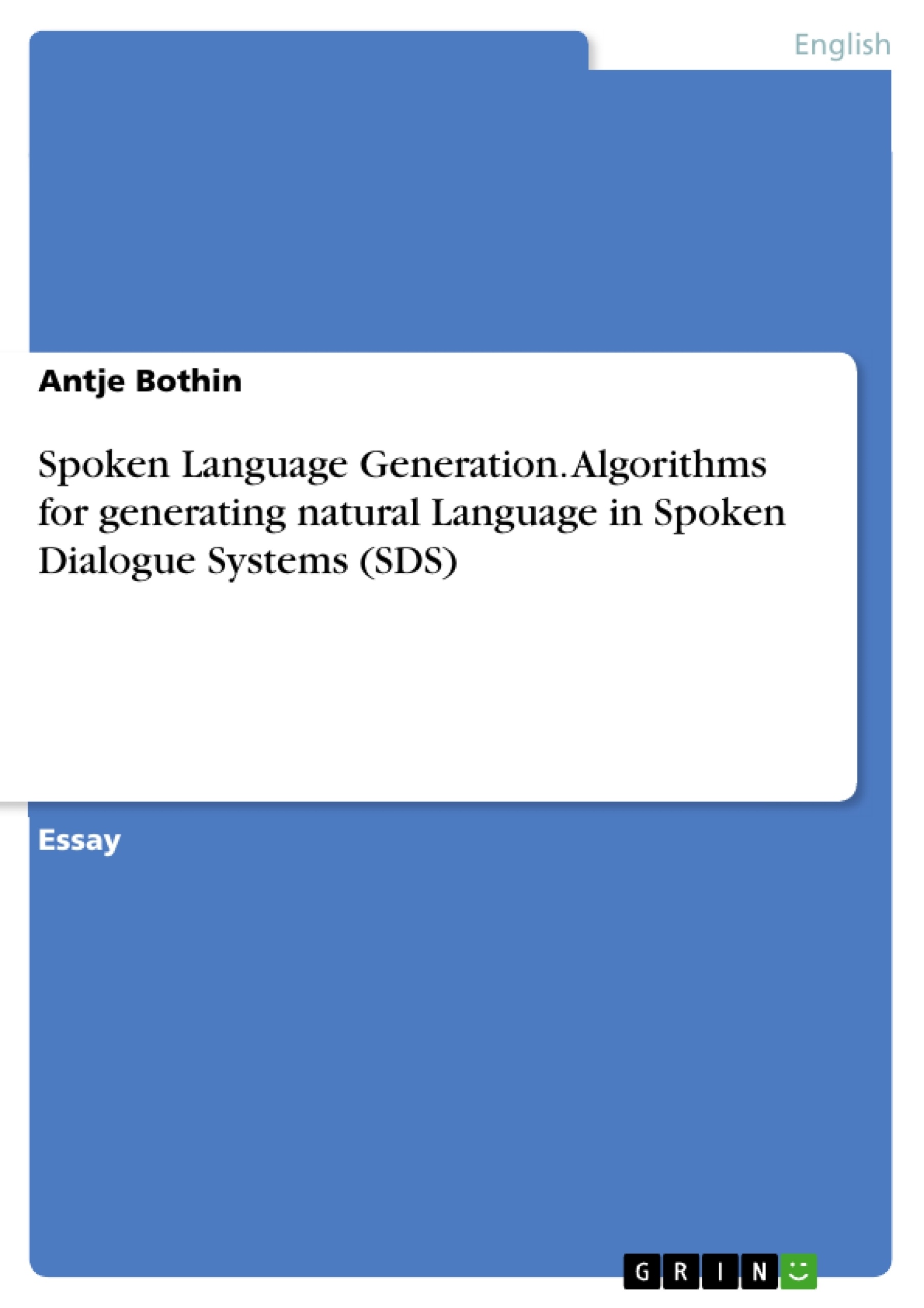This essay describes several algorithms for generating natural language in spoken dialogue systems (SDS).
Natural language generation (NLG) deals with the transformation of semantic representations to well-formed utterances.
As speech significantly differs from written documents it is necessary to develop different approaches for its generation than for text.
SDS should produce easily understandable, human-like sentences in order to increase the facility of information retrieval as well as the convenience of use for humans.
The purpose of this essay is to compare template-based (e.g. GENESIS and GENESIS-II), rule-based, and hybrid linguistic / statistical (e.g. HALogen, Acorn, Communicator, NLG [1 – 4], SPoT and SPaRKy) methods and to highlight their strengths and weaknesses.
This evaluation may be helpful when creating new SDS in practice.
However, the final decision what algorithm to use depends on the task and the users’ needs as well as the time, money, and effort available for the system’s development.
Inhaltsverzeichnis (Table of Contents)
- Introduction
- Algorithms
- Template-based Methods
- GENESIS
- GENESIS-II
- Rule-based Methods
- Hybrid Linguistic / Statistical Methods
- HALogen
- Acorn
- Template-based Methods
- Recommendations and Future Developments
- Summary
Zielsetzung und Themenschwerpunkte (Objectives and Key Themes)
This essay explores various algorithms for generating natural language in spoken dialogue systems (SDS), focusing on the need for human-like and understandable speech output. The objective is to compare and contrast template-based, rule-based, and hybrid linguistic/statistical methods, highlighting their strengths and weaknesses. This evaluation aims to provide practical guidance for developing new SDS, considering factors like task complexity, user needs, and available resources.
- Natural Language Generation (NLG) in Spoken Dialogue Systems (SDS)
- Comparison of Template-based, Rule-based, and Hybrid Linguistic/Statistical NLG Algorithms
- Strengths and Weaknesses of Different NLG Approaches
- Practical Considerations for Choosing NLG Algorithms in SDS Development
- Future Directions in NLG Research for SDS
Zusammenfassung der Kapitel (Chapter Summaries)
The essay begins by introducing the importance of NLG in SDS, emphasizing the need for efficient, human-like, and contextually appropriate speech generation. It highlights the challenges posed by real-time constraints and the differences between spoken and written language.
The second chapter delves into the different algorithms used for generating speech: template-based, rule-based, and hybrid linguistic/statistical methods. Template-based methods, exemplified by GENESIS and GENESIS-II, offer simplicity and ease of implementation but suffer from inflexibility and limited domain applicability. Rule-based methods, while providing greater flexibility and domain independence, face challenges in real-time performance and the need for extensive linguistic knowledge. Hybrid linguistic/statistical methods, such as HALogen and Acorn, aim to emulate human speech patterns through statistical learning, resulting in more natural and varied output but requiring training data and computational resources.
Schlüsselwörter (Keywords)
Spoken Dialogue Systems (SDS), Natural Language Generation (NLG), Template-based Methods, Rule-based Methods, Hybrid Linguistic/Statistical Methods, GENESIS, GENESIS-II, HALogen, Acorn, Real-time Performance, Domain Independence, Flexibility, User Needs, System Development.
Frequently Asked Questions
What is Natural Language Generation (NLG) in Spoken Dialogue Systems?
NLG is the process of transforming internal semantic representations into human-like, well-formed spoken utterances within a computer system.
What are template-based NLG methods?
Template-based methods (like GENESIS) use predefined sentence structures with slots for variables. They are easy to implement but lack flexibility and variety.
What is the advantage of hybrid linguistic/statistical methods?
Hybrid methods (like HALogen or Acorn) combine grammatical rules with statistical learning to produce more natural, varied, and human-like speech output.
Why is generating speech different from generating text?
Speech often involves real-time constraints, different grammatical structures, and the need for prosody and context-dependent phrasing that written text does not require.
How do I choose the right algorithm for an SDS?
The choice depends on the specific task, user needs, available training data, and the balance between development effort and the desired naturalness of the output.
- Citar trabajo
- Antje Bothin (Autor), 2007, Spoken Language Generation. Algorithms for generating natural Language in Spoken Dialogue Systems (SDS), Múnich, GRIN Verlag, https://www.grin.com/document/303797



